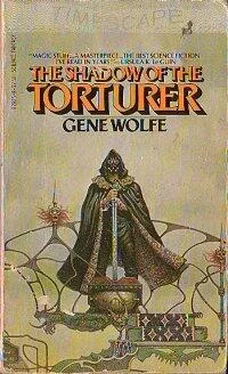Many of the sick were awake and stared at me, but none spoke. A door at the end of the room opened onto a flight of steps, and these descended to a courtyard where destriers stamped. For a moment I thought I was dreaming still: the cynocephalus was climbing upon the crenelations of the wall. But it was an animal as real as the champing steeds, and when I threw a bit of rubbish at it, it bared teeth as impressive as Triskele’s.
A trooper in a hauberk came out to get something from his saddlebag, and I stopped him and asked where I was. He supposed that I meant in what part of the fortress, and pointed out a turret behind which, he said, was the Hall of Justice; then told me that if I would come with him I could probably get something to eat.
As soon as he spoke, I realized I was famished. I followed him down a dark hallway into a room much lower and darker than the lazaret, where two or three score dimarchi like himself were bent over a midday meal of fresh bread, beef, and boiled greens. My new friend advised me to take a plate and tell the cooks I had been instructed to come here for my dinner. I did so, and though they looked a trifle surprised at my fuligin cloak, they served me without objection. If the cooks were incurious, the soldiers were curiosity itself. They asked my name, and where I came from, and what my rank was (for they assumed our guild was organized like the military). They asked where my ax was, and when I told them we used the sword, where that was; and when I explained that I had a woman with me who was watching it, they cautioned me that she might run away with it, and then counseled me to carry out bread for her under my cloak, since she would not be permitted to come where we were to eat. I discovered that all the older men had sup-ported women—camp followers of what is perhaps the most useful and least dangerous kind—at one time or another, though few had them now. They had spent the summer before in fighting in the north and had been sent to winter in Nessus, where they served to maintain order. Now they expected to go north again within a week. Their women had returned to their own villages to live with parents or relatives. I asked if the women would not have preferred to follow them south.
“Prefer it?” said my friend. “Of course they’d prefer it. But how would they do it? It’s one thing to follow cavalry that’s fighting its way north with army, for that doesn’t make more than a league or two on the best days, and if it clears three in a week, you can bet it will lose two the next. But how would they keep up on the way back to the city? Fifteen leagues a day. And what would they eat on the way? It’s better for them to wait. If a new xenagie comes to our old sector, they’ll have some new men. Some new girls will come too, and some of the old ones drop out, and it gives every-one a chance to change off if they want. I heard they brought in one of you carnifexes last night, but he was nearly dead himself. Have you been to see him?”
I said I had not.
“One of our patrols reported him, and when the chiliarch heard of it he sent them back to bring him, seeing we were sure to need one in a day or so. They swear they didn’t touch him, but they had to bring him back on a litter. I don’t know if he’s one of your comrades, but you might want to take a look.” I promised I would, and after thanking the soldiers for their hospitality, left them. I was worried about Dorcas, and their questioning, though it was clearly well meant, had made me uneasy. There were too many things I could not explain—how I had come to be injured, for example, if I had admitted I was the man who had been carried in the night before, and where Dorcas had come from. Not really understanding those things myself bothered me at least as much, and I felt, as we always feel when there is a whole sector of our lives that cannot bear light, that no matter how far the last question had been from one of the forbidden subjects, the next would pierce to the heart of it.
Dorcas was awake and standing by my bed, where someone had left a cup of steaming broth. She was so delighted to see me that I felt happy myself, as though joy were as contagious as a pestilence. “I thought you were dead,” she told me. “You were gone, and your clothes were gone, and I thought they had taken them to bury you in.”
“I’m all right,” I said. “What happened last night?”
Dorcas became serious at once. I made her sit on the bed with me and eat the bread I had brought and drink the broth while she answered. “You remember fighting with the man who wore that strange helmet, I’m sure. You put on a mask and went into the arena with him, although I begged you not to. Almost at once he hit you in the chest, and you fell. I remember seeing the leaf, a horrible thing like a flatworm made of iron, half in your body and turning red as it drank your blood.
“Then it fell away. I don’t know how to describe it. It was as though everything I had seen had been wrong. But it wasn’t wrong—I remember what I saw. You got up again, and you looked… I don’t know. As if you were lost, or some part of you was far away. I thought he was going to kill you at once, but the ephor protected you, saying he had to allow you to get your avern. His was quiet, the way yours bad been when you pulled it up in that awful place, but yours had begun to writhe and open its flower—I thought it had been open before, the white thing with the swirl of petals, only now I believe I was thinking too much of roses, and it had not been open at all. There was something underneath, something else, a face like the face poison would have, if poison had a face. “You didn’t notice. You picked it up and it began to curl toward you, slowly, as though it were only half awake. But the other man, the hipparch, couldn’t believe what he had seen. He was staring at you, and that woman Agia was shouting to him. And all at once he tumed and ran away. The people who were watching didn’t want him to, they wanted to see someone killed. So they tried to stop him, and he…”
Her eyes were brimming with tears; she tumed her head to keep me from seeing them. I said, “He struck several of them with his avern, and I suppose killed them. Then what happened?”
“It wasn’t just that he struck them. It struck at them, after the first two, like a snake. The ones who were cut with the leaves didn’t die at once, they screamed, and some of them ran and fell and got up and ran again, as if they were blind, knocking other people down. And at last a big man struck him from behind and a woman who had been fighting somewhere else came with a braquemar. She cut the avern—not sidewise but down the stem so it split. Then some of the men held the hipparch and I heard her blade clash on his helmet. “You were just standing there. I wasn’t sure you even knew he was gone, and your avern was bending back toward your face. I thought of what the woman had done and hit at it with your sword. It was heavy, so very heavy at first, and then it was hardly heavy at all. But when I slashed down with it I felt as if I could have struck the head from a bison. Only I had forgotten to take off the sheath. But it knocked the avern out of your hand, and I took you and led you away . …”
“Where?” I asked.
She shivered and dipped a piece of bread in the steaming broth. “I don’t know. I didn’t care. It was just so good to be walking with you, to know I was taking care of you the way you had taken care of me before we got the avern. But I was cold, terribly cold, when night came. I put your cloak all around you and fastened it in front, and you didn’t seem to be cold, so I took this mantle and wrapped myself in it. My dress was falling to pieces. It still is.” I said, “I wanted to buy you another one when we were at the inn.” She shook her head, chewing the tough crust. “Do you know, I think this is the first food I’ve had in a long, long time. I have pains in my stomach—that’s why I drank the wine there—but this makes it feel better. I hadn’t realized how weak I was getting.
Читать дальше










